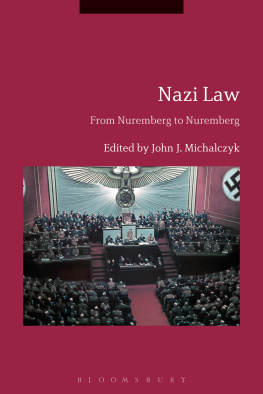ROUTLEDGE LIBRARY EDITIONS: NAZI GERMANY AND THE HOLOCAUST
Volume 8
THE SHAPING OF THE NAZI STATE
THE SHAPING OF THE NAZI STATE
Edited by
PETER D. STACHURA
First published in 1978
This edition first published in 2015
by Routledge
2 Park Square, Milton Park, Abingdon, Oxon, OX14 4RN
and by Routledge
711 Third Avenue, New York, NY 10017
Routledge is an imprint of the Taylor & Francis Group, an informa business
1978 Peter D. Stachura
All rights reserved. No part of this book may be reprinted or reproduced or utilised in any form or by any electronic, mechanical, or other means, now known or hereafter invented, including photocopying and recording, or in any information storage or retrieval system, without permission in writing from the publishers.
Trademark notice: Product or corporate names may be trademarks or registered trademarks, and are used only for identification and explanation without intent to infringe.
British Library Cataloguing in Publication Data
A catalogue record for this book is available from the British Library
ISBN: 978-1-138-79664-5 (Set)
eISBN: 978-1-315-75774-2 (Set)
ISBN: 978-1-138-80336-7 (Volume 8)
eISBN: 978-1-315-75371-3 (Volume 8)
Publishers Note
The publisher has gone to great lengths to ensure the quality of this reprint but points out that some imperfections in the original copies may be apparent.
Disclaimer
The publisher has made every effort to trace copyright holders and would welcome correspondence from those they have been unable to trace.
THE SHAPING OF THE NAZI STATE
EDITED BY PETER D. STACHURA
1978 Peter D. Stachura
Croom Helm Ltd., 2-10 St Johns Road, London SW11
British Library Cataloguing in Publication Data
The shaping of the Nazi state.
1. National socialism 2. Germany Politics and government 1918-1933 3. Germany Politics and government 1933-1945
I. Stachura, Peter D
335.60943 DD240
ISBN 0-85664-471-4
Published in the USA 1978 by
Harper & Row Publishers, Inc.
Barnes & Noble Import Division
Library of Congress Cataloging in Publication Data
Main entry under title:
The Shaping of the Nazi state.
Bibliography: p
Includes index.
1. GermanyPolitics and government1918-1933.
2. GermanyPolitics and government1933-1945.
3. National socialism. I. Stachura, Peter D.
DD249.S43320.9430857710038
ISBN 0-06-496492-2
Printed and bound in Great Britain by
Redwood Burn Limited, Trowbridge & Esher
CONTENTS
For Marie, George and Michael
Peter D. Stachura
National Socialism, as a historical phenomenon, continues to exert a special kind of fascination among wide sections of the general public as well as professional historians. Books, monographs, and learned papers on the subject have accumulated to the point where even the specialist is increasingly hard pushed to keep abreast of all the latest developments and lines of enquiry. This compelling interest exists despite the fact that National Socialism arose more than half a century ago, and collapsed amidst the most ignominious circumstances imaginable in 1945.
There are many good reasons, however, why this topic still attracts such far-ranging attention. It is not just that National Socialism, and particularly its Fhrer, Adolf Hitler, remain essentially enigmatic and elusive of comprehensively satisfying and precise definition. The era itself in which all this took place was so utterly extraordinary and grotesque by any measurement. The circus-like atmosphere of the Third Reich, the absurd antics of its leadership, the awesome sight of disciplined marching columns, the frenzied mass rallies, all seem to promote an aura of the unbelievable about the years 1933 to 1945. Yet the prosaic and gargantuan evil of the Hitlerian epoch, epitomised by the physical annihilation of millions of people, especially of Jews and Eastern Europeans, will remain its indelible hallmark. Names like Auschwitz, Buchenwald, Bergen-Belsen, and Dachau will be forever synonymous with National Socialism. They bear lucid testimony to its devastatingly destructive impact on the whole physical and ethical fabric of European culture and civilisation. There are too many people, uprooted and displaced as a direct result of the Second World WarHitlers Warwho, having experienced the nightmare of National Socialism at first hand, can never allow discussion and judgement of it to rest. For them, above all, National Socialism can never be forgotten, or forgiven.
Moreover, while all the answers to the critical problems of why Germany should have been the first highly industrialised and advanced country to witness the advent to power of an avowedly totalitarian party, and why such a richly cultural nation could have succumbed to nihilistic barbarism in the form of Hitlers dictatorship, have not been supplied, searching examination of National Socialism must go on. Otherwise, the course of not only German but also European and world history in the twentieth century cannot be understood as deeply or as sensitively as it should be.
From a narrowly academic point of view, it must be borne in mind that a good deal of the literature on National Socialism which appeared in the decade or so after Germanys defeat, especially where it related to the era of the Third Reich, was inevitably and understandably influenced by the direct personal involvement of many authors in that calamitous period. Survivors of the Weimar political system, the concentration camps, and opponents from Germany and other countries certainly wrote much that was in detail useful and relevant. They unequivocally established and documented the cruelty and inhumanity of the National Socialists, but they naturally lacked that necessary detachment for their accounts and impressions to be regarded as entirely objective and sober appraisals. In consequence, it is only comparatively recently that dispassionate, scholarly perspectives have been brought to bear which allow National Socialism to be analysed within conventional criteria of historical enquiry.
Thus, notwithstanding the plethora of literature, there is considerable scope for new interpretations and reassessment of many basic questions, and for more probing scrutiny of still relatively unexplored aspects of National Socialism. While it would be quite inappropriate to suggest that the Nazi era as a whole requires thorough revisionist assessment, it is already the case that some areas, such as the relationship between the internal political dynamics of the Third Reich and its social and economic organisation, and the broad field of foreign policy development, have been the subject of much fresh re-evaluation in recent historiography. Further aspects which need more systematic consideration include the sociological typology of the National Socialist movement, and the nature and magnitude of links between the Nazi Party and big business. The Shaping of the Nazi State














